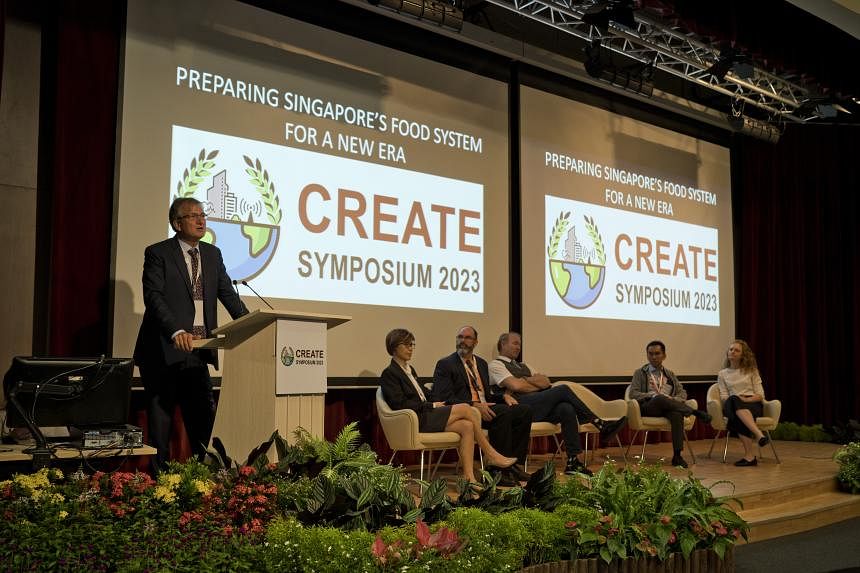SINGAPORE – Can the Republic achieve its “30 by 30” food security goal, to produce 30 per cent of its food requirements locally by 2030 as part of the Singapore Green Plan?
Experts say the challenges to meeting the goal include the need to reduce food wastage and for people to change their ideas of what they think of as palatable food, as well as the financial sustainability of alternative food research and development (R&D).
Despite less than 1 per cent of its land being set aside for farming, Singapore has been working hard to find solutions that offer alternative food sources and production methods through start-ups, research groups and government efforts.
The developments were discussed by experts who spoke during the panel discussion titled Preparing Singapore’s Food System For A New Era, at the National Research Foundation’s Create Symposium 2023 on July 10.
Among other things, they said new technology developed to produce alternative food must tackle Singapore’s high food waste, which accounts for 12 per cent of total waste.
According to the Ministry of Sustainability and the Environment’s website, with food being one of the biggest waste streams, there is a spillover effect where other resources used to produce, transport and ultimately dispose of food are wasted as well.
Panellist Iris Haberkorn, a senior scientist at the Singapore-ETH Centre, said that if a third of the food that is produced is not wasted, “we could significantly save carbon emissions”.
Dr Haberkorn called a focus on upcycling food waste a “promising approach”. “Food wasted by the consumer is an indication of wealth,” she said on the high levels of food waste in Singapore.
Dr Haberkorn is leading a team at the centre to develop technology to transform micro-algae into an alternative protein source and food products, to establish a sustainable food system.
Another speaker, Ms Florence Leong, co-founder and director of local food innovation firm KosmodeHealth, said there is a need to “go back to the basics and make better use of the resources we have”.
For example, her start-up manufactures W0W noodles, which are produced using the protein and fibre extracted from spent barley grains, a by-product of beer and malt production, of which more than 75,000 tonnes is generated annually and would potentially be sent to the landfill.
She stressed the need for alternative food source efforts to focus on staple foods such as noodles or rice, which she called “the core of food security”.
Another speaker, Professor Michael Strano from the Singapore-MIT Alliance for Research and Technology, addressed how the efficacy of R&D for Singapore’s 2030 goal depends on consumer behaviour.
He said that throughout time, “we evolved a psychological mechanism around food”, which can be seen in consumer preferences when determining what is considered palatable.
Prof Strano added that “evolutionarily, if you go back to our ancestors, the food that they found, the agricultural products, if we were to eat them today, we would barely find them edible, we would find them disgusting”.
Ms Leong agreed, saying “a huge consumer mindset and behavioural change” is necessary for the success of alternative food products.
She pointed out another challenge. While she praised the Government’s vision in setting “30 by 30”, she believes there is an over-emphasis on complex technology, like urban farming, that may not be economically sustainable enough to reach the goal within seven years.
“The price point is high, so adoption is slow. Because of that, there is a lot of wastage,” Ms Leong said about many recent cost-heavy technological solutions.
She added that as a result, many start-ups that require funding cannot sustain their R&D projects, causing what she called a vicious circle.
Despite the high costs of vertical farming, Professor Thomas Becker from the Technical University of Munich is optimistic about the technology.
He said that sometimes, these high costs may “subsidise the damage done (to the environment) in normal farming”.
Dr Ngin Hoon Tong from the Singapore Food Agency agreed, adding that buying hydrogen or racks for crops “are potential options in terms of reducing carbon utilisation in the agri-food sector”.
Ms Leong said that at another event she had spoken at, she asked who in the audience thought Singapore could reach the “30 by 30” goal, and only a small number of respondents said they thought it is possible.

